Vaccines: Will they become a form of Secondary and Primary Breast Cancer Prevention?
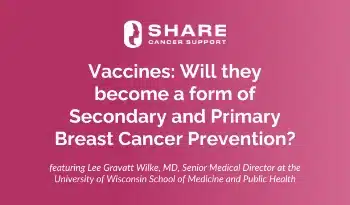
Our guest speaker Lee Gravatt Wilke, MD, Senior Medical Director at the University of Wisconsin School of Medicine and Public Health, explains the current state of vaccine clinical trials in breast cancer followed by a review of the STEMVAC trial, design of the vaccine, and the current state of the accrual and next steps. Key […]
Understanding and Managing Chemo-Induced Peripheral Neuropathy (CIPN)
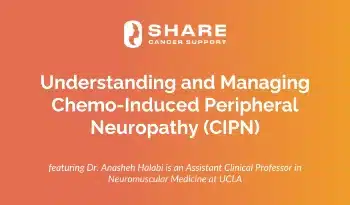
Certain chemotherapy drugs can cause chemotherapy-induced peripheral neuropathy (CIPN), which is one of the most common side effects of treatment. Chemotherapy treatments cause peripheral neuropathy by damaging the nerves in the fingers, hands, arms, legs, and feet. This can lead to symptoms including pain, numbness, tingling, and difficulty with mobility, which can greatly impact one’s […]
Let’s Talk About It: Shifting Focus: The Relationship with Your Body
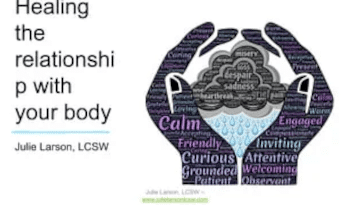
Cancer treatment can change the relationship you have with your body. Surgical scars, hair loss, changes in sensitivity, discomfort or pain, and ongoing side effects can be overwhelming and emotional to experience. Feelings of loss, disconnect, anger, and shame are normal to have but can be uncomfortable or complicated to navigate. Julie Larson, LCSW, openly […]
Part II: DCIS Research: De-escalating the Fear of Recurrence
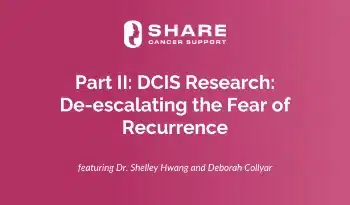
Ductal carcinoma in situ (DCIS) can be treated with surgery, or with Active Monitoring for low-risk DCIS. Chemotherapy is not needed, although sometimes radiation or hormone therapy are suggested. Most DCIS never develops into an invasive cancer. In part 2 of the DCIS webinar series, we discuss where research is taking us. For those who […]
Let’s Talk About It: Breast Cancer (Caring for You: The Mental & Emotional Toll of Survivorship)
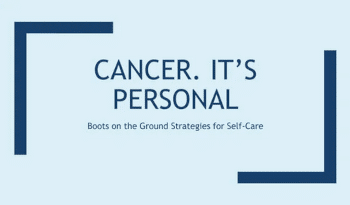
A cancer diagnosis is stressful. From gathering information about treatment options to navigating relationships with loved ones, it is normal to feel overwhelmed and emotional. This session will provide concrete tools for sharpening self-awareness to better understand needs and gain strategies for coping with intense emotions like worry and fear.
Methods to Reduce Risk of Recurrence, Fertility Concerns, & Emotional Impact of Breast Cancer
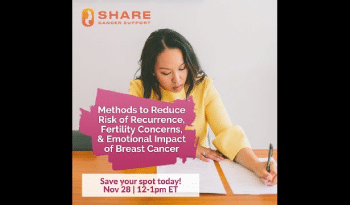
After being diagnosed with breast cancer, many of us focus on how to keep cancer from coming back, how treatment forever changes our lives, our bodies and our minds. Our guest speaker Dr. Eleonora Teplinsky, Head, Breast Medical Oncology; Clinical Assistant Professor of Medicine, The Icahn School of Medicine, Mount Sinai, will address the following […]
Let’s Talk About It: Breast Cancer (The History and Advances in Radiation Therapy)
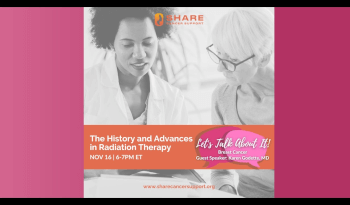
We know that radiation therapy (RT) is an important component of breast cancer treatment that reduces local recurrence and improves survival after breast conservation. Have you ever wondered about the history of radiation and the role of radiation boosts to the primary tumor site? How do radiation oncologists determine who should receive radiation therapy or […]
Scalp Cooling 101

In simplified terms, scalp cooling systems are tightly fitting, helmet-like hats filled with a cold gel or liquid that you wear during chemotherapy infusions. It is a device that can help many people keep some or quite a bit of their hair during chemotherapy which can cause hair loss. It has been life-changing for many […]
The Cost of Cancer: Financial Burdens of Treatment
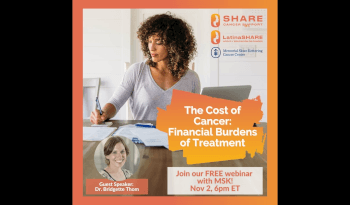
Financial stress, also called financial toxicity, is a devastating but increasingly common side effect of cancer care that impacts individuals living with cancer and those coping with the long-term treatment effects. But what are some ways to deal with the financial toll? Join Dr. Bridgette Thom, from Memorial Sloan Kettering’s Department of Nursing, as she […]
